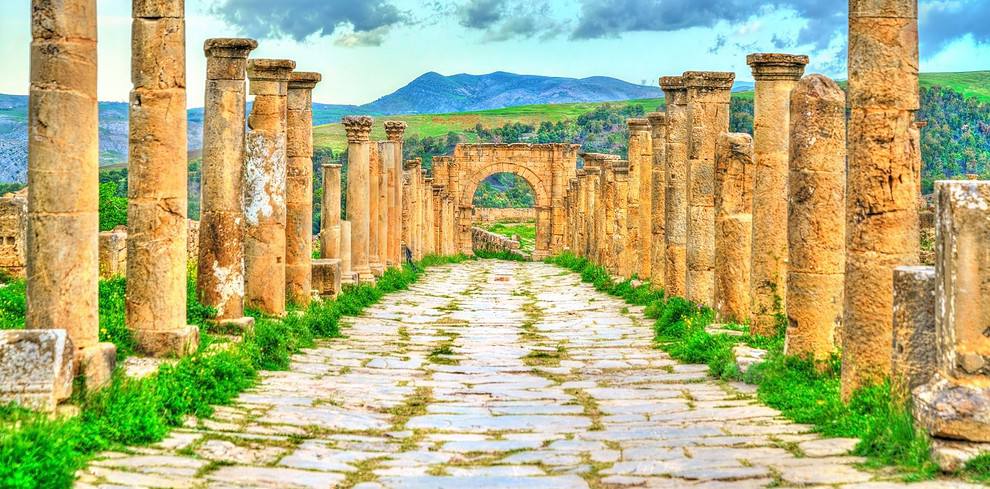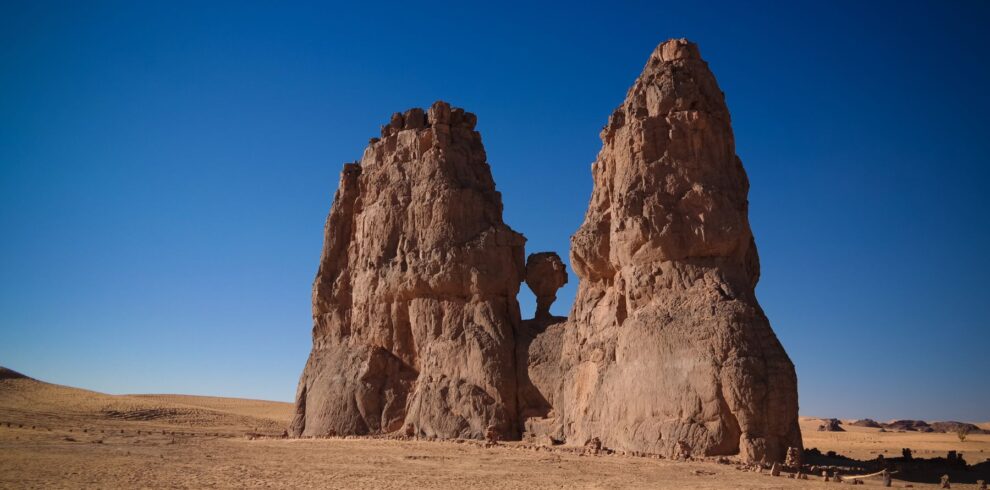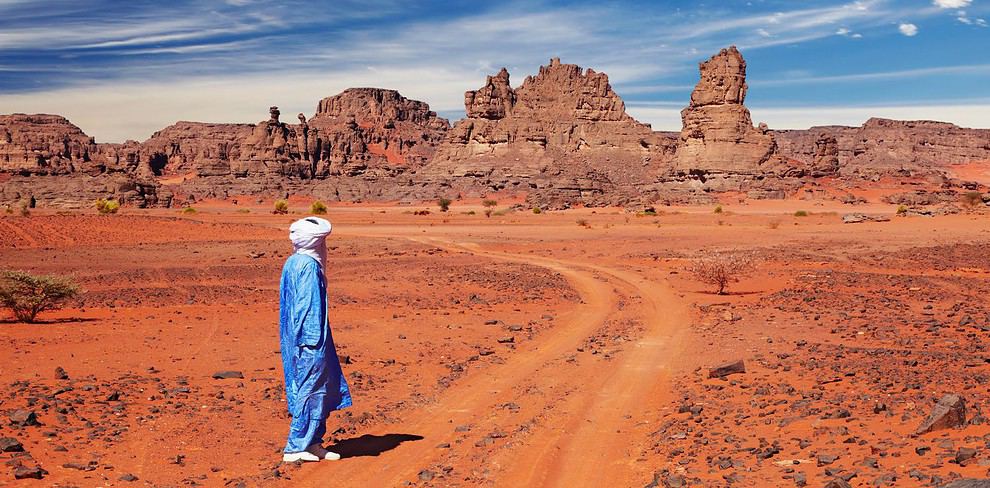Table of Contents
Explore the rich of Algeria Culture as we offer you a comprehensive insight into the customs of Algeria, along with its multifaceted and lively heritage, which encompasses traditions, values, and distinctive customs and practices.
Algerians hold a deep appreciation for hospitality, warmly embracing guests. Family plays a central role in Algerian society, fostering strong connections and a profound sense of community. It’s essential to acknowledge that Algeria culture is in constant development, influenced by historical occurrences, regional dynamics, and global interactions.
Grasping the culture of Algeria can offer valuable perspectives into the intricate and diverse society of the nation.
Algeria Culture
Here are the most important points to begin learning about Algeria culture and customs:
- Ethnic Diversity: Algeria is home to a diverse mix of ethnic groups, each with its own customs and traditions. Arabs, Berbers, Tuaregs, and Mozabites are some of the major ethnic communities.
- Languages: The official languages are Arabic and Berber, but numerous regional languages and dialects are spoken throughout the country.
- Islamic Practices: Algeria is predominantly a Muslim country, and Islam is deeply ingrained in Algeria culture, affecting daily life, values, and societal norms. This includes daily prayers, fasting during Ramadan, and adherence to Islamic dietary laws. The majority of Algerians practice Sunni Islam.
- Greeting Etiquette: Greetings are an essential part of Algeria culture. Handshakes are common between men, while men and women usually do not shake hands. Instead, they greet each other verbally with polite phrases.
- Traditional Clothing: Traditional Algerian clothing, such as the “djellaba” for men and similarly styled dresses for women, is commonly worn. Traditional attire varies by region and ethnicity but remains an integral part of Algerian identity.
- Cuisine: Algerian cuisine features dishes like couscous, tagine, and a variety of stews. It reflects a fusion of Mediterranean, North African, and Middle Eastern flavors.
- Hospitality: Algerians are renowned for their warm hospitality. When guests visit, they are offered tea, meals, and often a place to stay. It is considered impolite to decline such offers.
- Respect for Elders: Respect for elders is a deeply ingrained custom. Younger individuals show deference to their seniors through words and actions.
- Arts and Crafts: Algeria has a rich tradition of arts and crafts, including pottery, traditional textiles, calligraphy, and henna art.
- Music and Dance: Traditional Algerian music includes instruments like the oud and bendir. Folk dances are an integral part of cultural celebrations.
- Celebration of Festivals: Algerians celebrate various religious and cultural festivals, such as Eid al-Fitr, Eid al-Adha, and Amazigh New Year (Yennayer). These celebrations often involve special prayers, feasts, and gatherings with family and friends.
- Family and Community: Family is central to Algerian society, and strong community bonds are essential for support and social cohesion.
- Gender Roles: Gender roles are traditionally defined, with men and women often occupying distinct social spheres. However, changes are occurring, particularly in urban areas.
- Arranged Marriages: Arranged marriages are a prevalent custom in Algeria. Families play a central role in matchmaking, and the union is seen as a commitment not only between individuals but also between families.
- History and Resilience: Algeria’s history, including its struggle for independence, has shaped its culture, fostering resilience and a strong sense of national identity.
These customs are essential aspects of Algeria culture and are readily visible in everyday life, reflecting the country’s rich cultural heritage and strong sense of community and tradition.
Algeria Traditional Attire
Algeria traditional attire is a reflection of the country’s diverse cultural heritage, regional variations, and historical influences. The clothing worn by Algerians not only serves functional purposes but also carries significant cultural and social meanings.
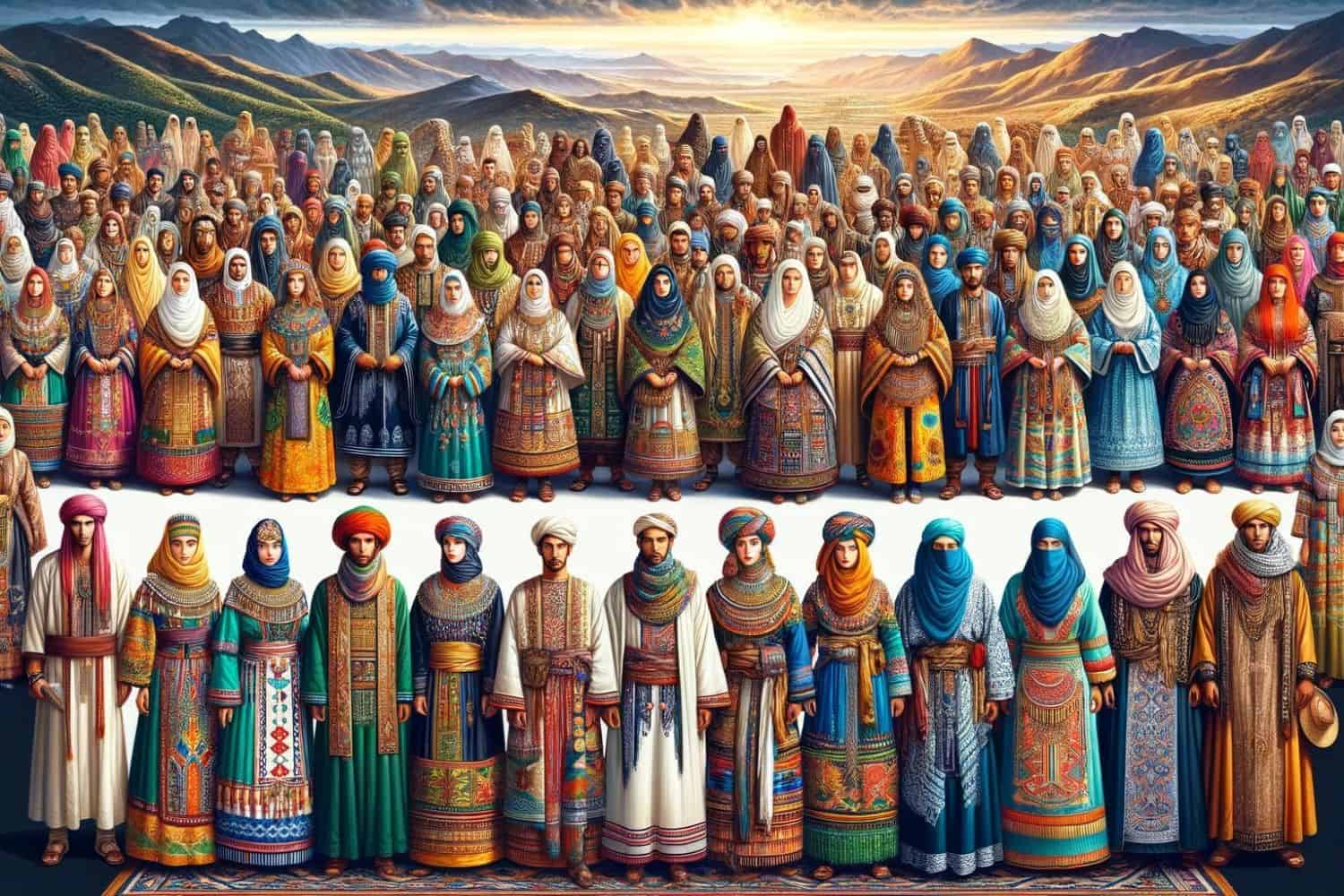
1. Regional Variation: Algeria’s traditional clothing varies from region to region, influenced by the local climate, lifestyle, and ethnic traditions. In the cooler northern areas and mountainous regions, people tend to wear heavier and more layered garments, while in the hotter southern areas, lighter clothing is preferred.
2. Berber Dress: The traditional attire of the Berber ethnic group, one of Algeria’s largest, includes the “djellaba.” This garment consists of a long, loose-fitting robe often worn with a hood. Women may wear colorful headscarves and intricate jewelry to complement their outfits.
3. Kabyle and Tuareg Attire: Kabyle and Tuareg communities, among others, have their distinctive traditional clothing. For instance, Kabyle women often wear embroidered dresses with vibrant patterns, while Tuareg men are known for their indigo-blue turbans and flowing robes.
4. Nomadic and Desert Clothing: Nomadic tribes in Algeria, such as the Touareg people, have unique attire adapted to their desert lifestyles. They might wear robes designed to protect from the harsh desert sun and sand, along with distinctive head coverings. These nomadic styles are both functional and symbolic of their cultural identity.
5. Modesty and Cultural Significance: Traditional Algerian clothing places emphasis on modesty, with loose-fitting garments that cover the body. The choice of colors, fabrics, and embroidery often carries cultural and regional significance. Attire can also indicate one’s social or marital status.
6. Special Occasion Attire: Algerians dress elaborately for special occasions and celebrations, with vibrant and ornate clothing adorned with intricate embroidery, beadwork, and jewelry. Events like weddings, festivals, and religious ceremonies provide opportunities for individuals to showcase their finest traditional attire.
7. Adaptation to Modernity: While traditional attire remains significant, urbanization and modern influences have led to the integration of Western clothing in daily life, especially in cities like Algiers. Many Algerians now wear a blend of traditional and contemporary clothing, reflecting changing lifestyles and global fashion trends.
Algeria’s traditional attire is not just a matter of clothing; it is a vibrant expression of the country’s cultural diversity, history, and identity. It serves as a visual representation of the rich tapestry of traditions that have shaped Algerian society for centuries.
Algeria Marriage Traditions
Algeria marriage traditions are deeply rooted in the country’s rich cultural and religious heritage, with variations across different ethnic groups and regions. These traditions play a significant role in Algerian society, reflecting both historical practices and contemporary influences.
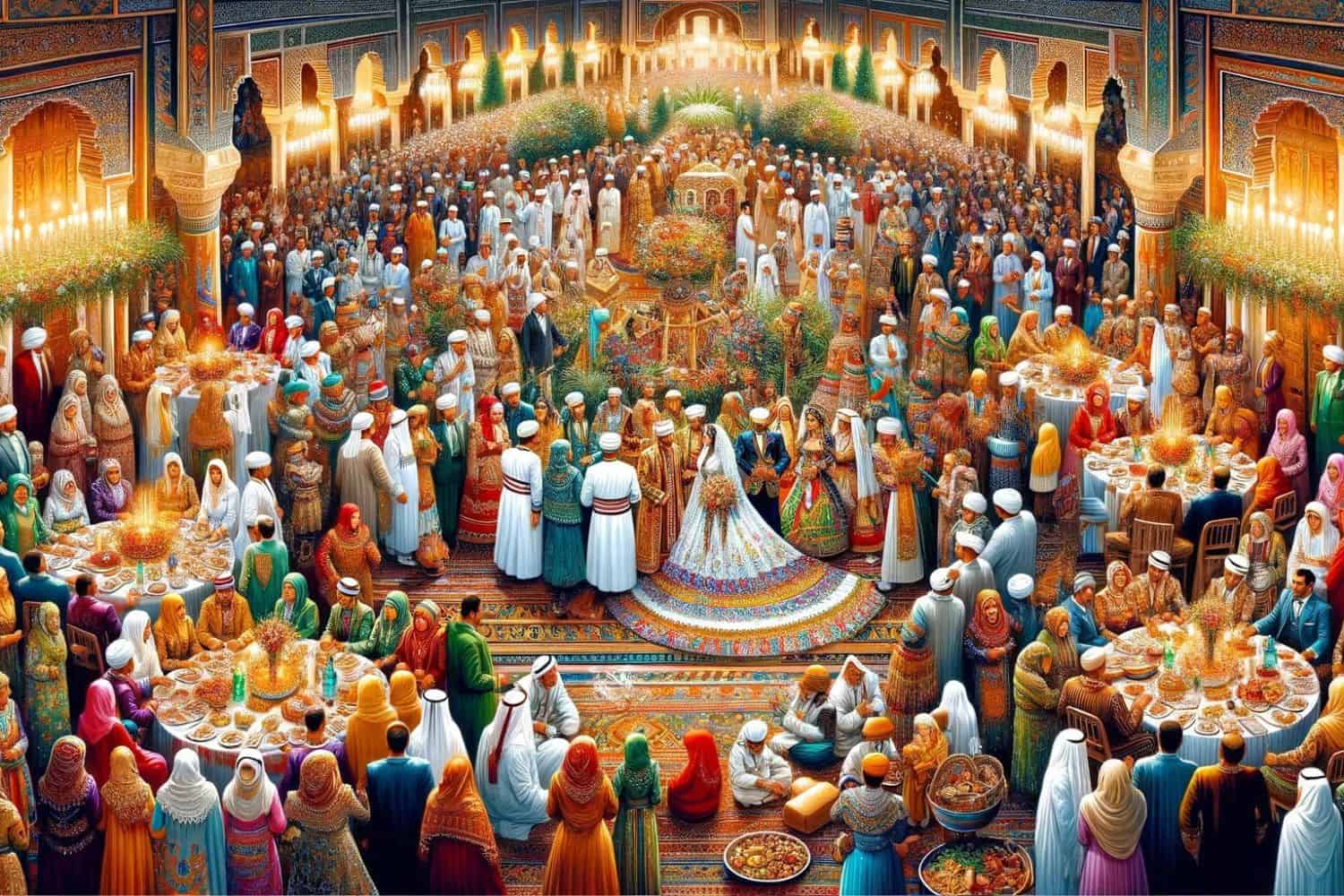
1. Arranged Marriages: Arranged marriages are common in Algeria. Families often play a pivotal role in selecting suitable partners for their children. Arranged marriages are seen as a way to maintain cultural and social cohesion and ensure compatibility between families.
2. Engagement: Once a suitable match is found, the engagement process begins with a formal agreement between the families. This agreement marks the commitment of the couple to marry.
3. Wedding Celebrations: Algerian weddings are elaborate affairs that often span multiple days. They typically involve traditional rituals, feasting, music, and dancing. The main wedding ceremony involves the signing of the marriage contract and is typically held in a mosque or at home.
4. Bride Price (Mahr): The groom is expected to provide a “mahr” or dowry to the bride as a sign of commitment and financial security. This practice varies in size and form depending on the families and regions involved.
5. Bridal Attire: Brides typically wear colorful and intricately designed dresses, often accompanied by intricate jewelry. The attire varies by region and ethnic group, with Berber, Arab, Kabyle, and Tuareg brides showcasing distinct styles.
6. Post-Wedding Customs: After the wedding, various traditions may continue, such as the “Walima,” a celebratory feast hosted by the groom’s family, and the “Fatiha,” a ceremony where the bride officially enters her new household.
7. Social and Religious Significance: Marriage is not only a social but also a religious sacrament in Algeria, with strong ties to Islamic customs and traditions. The marriage contract, called the “katb el-kitab,” is performed according to Islamic principles and often involves recitation from the Quran.
8. Family and Community Involvement: Algerian weddings are not only a celebration of the couple but also a community event. Extended families and the broader community play essential roles in supporting and participating in the festivities.
9. Contemporary Changes: In urban areas and among the younger generation, there is a growing trend toward love marriages, where individuals choose their partners based on personal preferences. However, these unions may still involve traditional customs and ceremonies.
Algerian marriage traditions reflect the importance of family, community, and cultural identity in Algerian society. While some practices have evolved over time, they continue to be a significant aspect of Algerian life, preserving the country’s cultural heritage and social bonds.
Algeria Food Culture
Algeria food culture is a captivating and diverse reflection of its history, geography, and the fusion of culinary traditions from North Africa, the Mediterranean, and the Middle East.
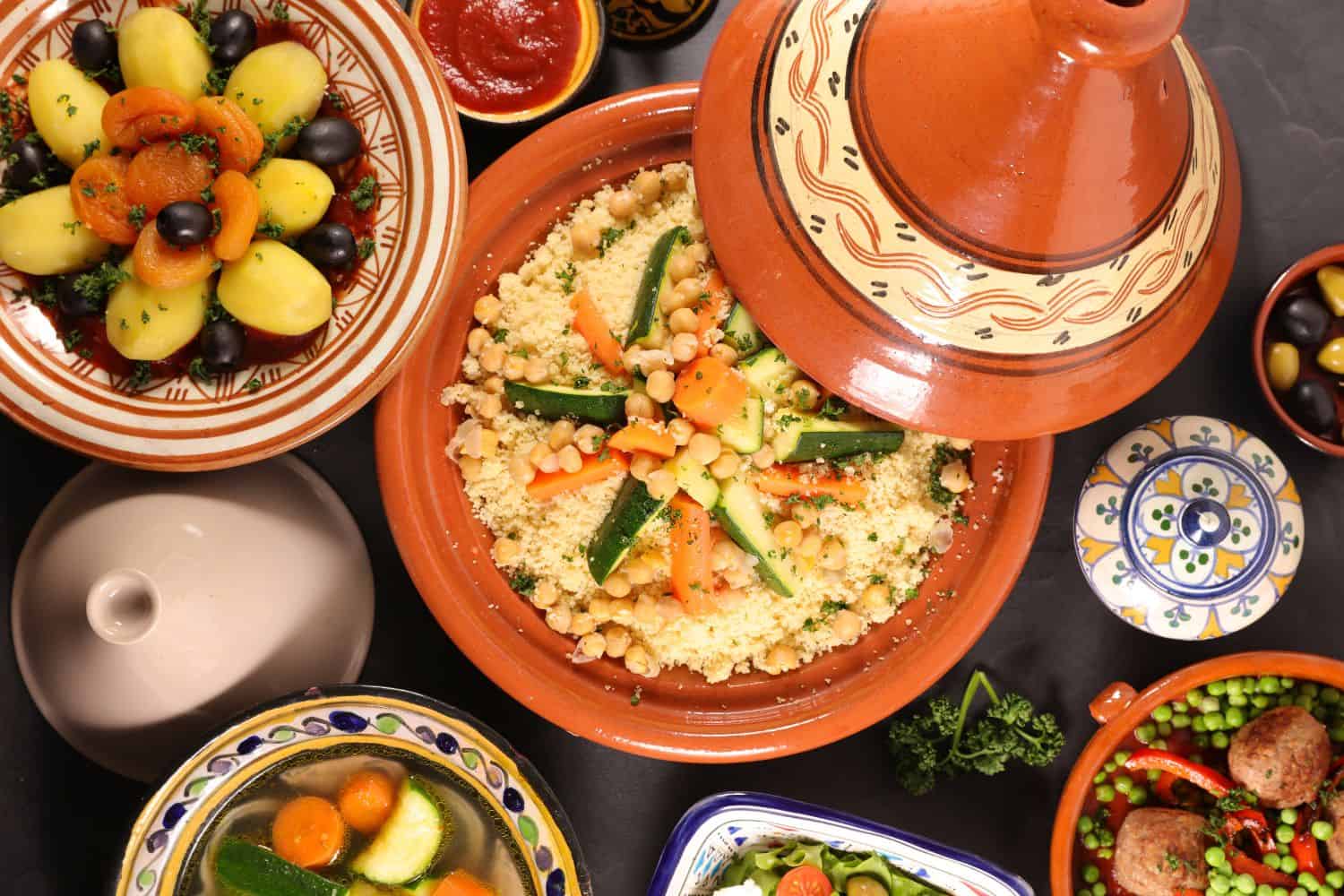
- Regional Variation: Food from Algeria showcases regional diversity stemming from its diverse geography, which includes coastal areas, mountains, and expansive desert landscapes. Each region incorporates distinct local ingredients and cooking techniques, contributing to a rich tapestry of flavors.
- Staple Foods: Algerian cuisine heavily relies on staple foods like couscous, bread (especially “khobz” or Algerian bread), and grains such as wheat and barley. Couscous dishes like “couscous aux légumes” and “couscous royal” are particularly popular.
- Grilled Meats and Tagines: Grilled meats, especially skewered meats, and tagines are iconic elements of Algerian cuisine. Lamb, beef, and chicken are commonly used, often marinated with spices before grilling or slow-cooked in tagines.
- Flavorful Spices and Herbs: Algerian cuisine incorporates an array of spices and herbs like cumin, coriander, paprika, and mint. These ingredients add depth and complexity to dishes.
- Traditional Dishes: Algerian cuisine boasts traditional dishes such as “brik” (stuffed pastries), “couscous merguez” (couscous with spicy sausages), “makbouba” (stuffed vegetables), and “chorba” (soup). These dishes may vary by region.
- Use of Dairy: Dairy products, especially yogurt and buttermilk, are common in Algerian cuisine and are used in dishes like “chorba beida” (white soup) and “rayeb” (buttermilk).
- Oven Baking: The oven, called a “four,” is frequently used for baking bread and preparing dishes like “tajine djeldjel” (chicken and vegetable stew) and various types of savory pies.
- Sweets and Desserts: Algerian sweets often feature ingredients like honey, almonds, and orange blossom water. “Makroud” and “qalb el louz” are popular desserts, especially during special occasions.
- Mint Tea Culture: Algerians have a deep appreciation for mint tea, known as “atay b’naana.” It is a cherished beverage, brewed with green tea, fresh mint leaves, and plenty of sugar, often served with hospitality and warmth.
- Family and Community Dining: Algeria culture places a significant emphasis on communal dining. Families and friends frequently come together around a “sif” (table) to enjoy meals as a group.
- Influence of the Algerian Diaspora: Algerian cuisine has gained recognition and popularity in various parts of the world due to the Algerian diaspora. Algerian restaurants in international cities offer a taste of Algeria culture to diverse audiences.
- Resilience and Adaptability: Despite historical challenges, Algerian cuisine has persisted and evolved. The resourcefulness of Algerian cooks is evident in their ability to create flavorful dishes even in challenging circumstances.
Book our services
These guiding services ensure that your journey is not only enjoyable but also informative and hassle-free. Algeria’s cultural delights, historical marvels, and natural wonders await your exploration with RJ Travel LLC. Our Algeria Private Tours are designed to immerse you in the rich cultural heritage, historical significance, and breathtaking landscapes of this extraordinary nation.
Contact Us and our team will make sure to help you plan your trip to Algeria when it’s safe and ready for travel. Whether you’re interested in joining a pre-arranged Algeria small group tou
More About Algeria
[the-post-grid id=”53368″ title=”Algeria Main page”]
Book Your Trip to Algeria Today!
Embark on an unforgettable journey and explore the allure of Algeria through our exclusive tours.

